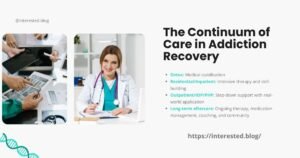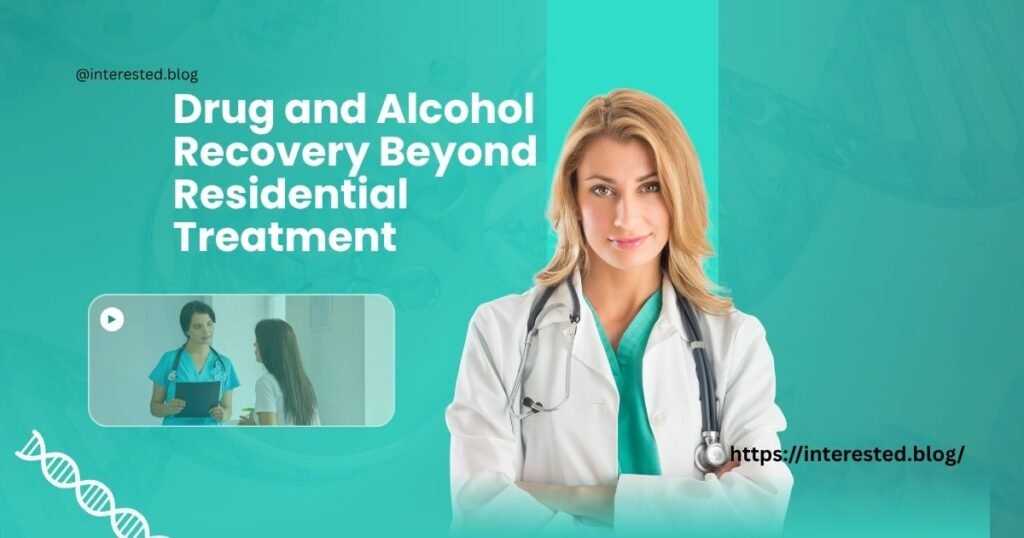Introduction
Recovery doesn’t end when the doors of a residential facility open and you step back into everyday life—it expands. Think of residential treatment as a launchpad, not the destination. The real work of building a healthy, meaningful life begins in the months and years that follow. That’s where Beyond Residential Treatment comes in: the strategies, supports, and structures that help you keep growing long after the structured program ends.
Why doesn’t recovery stop at discharge? Because life doesn’t stop. Stress, relationships, work, grief, joy, and the unexpected—these all continue. Sustainable sobriety depends on how you respond in real time, outside the facility, with tools that fit your real world.
This guide walks you through what to expect and what to put in place Beyond Residential Treatment so that long-term healing isn’t just possible—it’s practical.
What Happens After Residential Treatment Ends?
Leaving treatment can feel like stepping off a moving walkway—you’re still in motion, but now you’re walking on your own. Common experiences include:
- New routines that need to be built (and protected)
- Shifting social circles and redefining boundaries
- Emotional re-entry, where feelings feel louder without substances
- Scheduling recovery, not just “fitting it in”
Yes, it’s tough. It’s also a prime opportunity to reinforce skills, practice resilience, and discover what life can look like Beyond Residential Treatment.
Common myths about recovery after leaving a facility
- Myth 1: “If I completed rehab, I’m cured.”
Reality: Addiction recovery is managed, not cured. Think marathon, not sprint. - Myth 2: “I should be able to handle this on my own.”
Reality: Isolation is a common risk factor. Community is medicine. - Myth 3: “Aftercare is optional.”
Reality: Aftercare is where most people learn to live sober—day after day.
Why “Beyond Residential Treatment” Matters
Relapse isn’t a single moment; it often begins quietly with emotional and mental slips. Effective strategies include:
- Structured follow-up care: Outpatient therapy, IOPs, or PHPs provide continuity.
- Peer support: Regular meetings (12-Step, SMART Recovery, Refuge Recovery) create accountability.
- Relapse prevention planning: Personalized, written plans with triggers, early-warning signs, and action steps.
- Medication-Assisted Treatment (MAT) when appropriate: Stabilizes recovery for some individuals.
- Lifestyle design: Sleep, nutrition, movement, and purpose-driven activities.
How extended recovey approaches differ from initial residential care
Residential treatment stabilizes and equips you. Beyond Residential Treatment personalizes and integrates those tools into everyday life—at home, at work, and in the community—where triggers and decisions are nonstop and unfiltered.
Understanding Post-Treatment Vulnerabilities
- Stress & fatigue: Exhaustion lowers defenses.
- HALT (Hungry, Angry, Lonely, Tired): A classic checklist that predicts risk.
- Perfectionism: “If I can’t do it perfectly, why bother?” undermines progress.
Environmental risks and social pressures
- Old neighborhoods or hangouts
- Friends who still use
- Unstructured time that invites boredom and cravings
The role of unresolved trauma
Unprocessed trauma can power cravings and shame spirals. Beyond Residential Treatment often includes trauma-specific therapies to address root causes so recovery isn’t forever fighting yesterday’s battles.
The Continuum of Care in Addiction Recovery

Recovery often follows a continuum:
- Detox: Medical stabilization
- Residential/Inpatient: Intensive therapy and skill-building
- Outpatient/IOP/PHP: Step-down support with real-world application
- Long-term aftercare: Ongoing therapy, medication management, coaching, and community
How “Beyond Residential Treatment” fits into the continuum
It’s the bridge from clinical stabilization to sustainable independence. Without it, the gap between “what I learned” and “how I live” can swallow progress.
Outpatient Programs and Intensive Outpatient Programs (IOPs)
IOPs typically involve multiple therapy sessions per week (group and individual), relapse prevention education, and regular drug testing. Benefits include:
- Flexibility to work or study
- Accountability with measurable goals and check-ins
- Skill reinforcement in real-world contexts
Balancing real-life responsibilities with recovery support
- Calendar it: Treat sessions like non-negotiable appointments.
- Tell your support team: Boss, family, roommates—loop in what you need.
- Use micro-strategies: 5-minute grounding, meeting a sponsor at lunch, journaling before bed.
Partial Hospitalization Programs (PHPs) as a Middle Ground
PHPs provide daylong clinical support without overnight stays—ideal when you need more structure than IOP but less than residential. They help stabilize mental health symptoms that might complicate early recovery.
Who benefits most from PHPs?
- People with co-occurring disorders (e.g., anxiety, depression, PTSD)
- Those who struggle with early relapse post-discharge
- Individuals who need hands-on clinical oversight while living at home or in sober living
The Role of Sober Living Homes Beyond Residential Treatment
Sober living homes offer:
- Curfews and house rules
- Mandatory meetings
- Random testing
- Peer accountability
Benefits of living in a recovery-focused environment
- Transition ease: Build habits in a supportive space.
- Safe distance from high-risk environments.
- Community: Shared purpose speeds up growth.
Many people credit sober living as the turning point that made Beyond Residential Treatment sustainable.
Counseling and Therapy Options After Residential Care
- CBT (Cognitive Behavioral Therapy): Restructures unhelpful thoughts and behaviors.
- DBT (Dialectical Behavior Therapy): Emotion regulation, distress tolerance, interpersonal skills.
- EMDR (Eye Movement Desensitization and Reprocessing): Processes traumatic memories.
- Trauma-focused therapy: Integrates safety, processing, and stabilization.
Why continuing therapy is crucial Beyond Residential Treatment
Therapy refines your toolkit: you’ll meet new triggers—job stress, parenting, grief, joy—and need updated strategies. Ongoing counseling makes your plan dynamic and responsive.
Peer Support and Recovery Groups
These communities emphasize surrender, inventory, amends, and service. Sponsorship creates accountability and mentorship across stages of recovery.
Alternatives like SMART Recovery and Refuge Recovery
- SMART Recovery: Cognitive-behavioral, self-management focus.
- Refuge Recovery: Buddhist principles, meditation-based.
How peer accountability strengthens long-term outcomes
- Regular contact reduces isolation
- Shared language shortens the learning curve
- Service and sponsorship reinforce purpose—central to Beyond Residential Treatment
The Importance of Family Support Beyond Residential Treatment
Addiction affects the whole system. Family therapy can:
- Clarify roles and expectations
- Teach communication and conflict resolution
- Address codependency and enabling patterns
Setting boundaries and fostering a supportive home environment
- Clear boundaries about substances and behavior
- Shared routines that support sleep, meals, and meetings
- Open check-ins: “How can I support your recovery this week?”
Medication-Assisted Treatment (MAT) After Rehab
MAT (e.g., buprenorphine, methadone, naltrexone for OUD; acamprosate, naltrexone, disulfiram for AUD) can:
- Reduce cravings
- Lower relapse risk
- Stabilize brain chemistry
Addressing stigma around MAT Beyond Residential Treatment
Medication is not “cheating.” It’s evidence-based care. The goal is stability and function, not white-knuckle abstinence. Beyond Residential Treatment means using every effective tool available.
Building Relapse Prevention Plans
Create a custom trigger map:
- Internal: stress, shame, resentment, boredom
- External: payday, certain people, bars, anniversaries
- Early warnings: skipping meetings, secrecy, euphoric recall
Developing healthy coping strategies for the long run
- If X happens, I do Y (implementation intentions)
- 3×3 rule: 3 people to call, 3 grounding skills, 3 safe places
- Red-amber-green system: color-code risk and actions
Write it down. Share it with your sponsor, therapist, and family. Review monthly—this is the practical heart of Beyond Residential Treatment.
Life Skills Training and Career Development
- Time management: calendar blocking and prioritization
- Communication: assertiveness and boundary-setting
- Financial literacy: budgeting, saving, debt repayment
- Domestic skills: meal planning, cleaning routines
Employment assistance and educational opportunities
- Resume refresh, mock interviews, workplace etiquette
- Vocational training, certifications, GED, or college courses
- Seeking employers friendly to second-chance hiring
Work and learning add purpose—a core protective factor Beyond Residential Treatment.
The Role of Holistic Practices in Recovery Beyond Residential Treatment
- Yoga reconnects you to your body.
- Meditation trains attention and reduces reactivity.
- Art therapy externalizes feelings—especially useful when words are hard.
- Mindfulness cultivates nonjudgmental awareness: “I’m having a craving; it will pass.”
Reconnecting with self and purpose
Holistic practices help you become a compassionate observer of your own experience. That self-relationship is the engine of change Beyond Residential Treatment.
Nutrition and Physical Health in Sustaining Sobriety

- Stable blood sugar reduces irritability and cravings.
- Hydration and sleep improve mood regulation.
- Exercise boosts dopamine and resilience.
Creating a recovery-friendly lifestyle
- Balanced meals: protein, fiber, healthy fats
- Movement: daily walks or strength training
- Sleep hygiene: consistent bedtime, dark room, tech limits
This is the physiology of Beyond Residential Treatment—your body becomes an ally.
Spirituality and Finding Meaning Beyond Residential Treatment
Spirituality isn’t one-size-fits-all. For some it’s faith-based, for others it’s nature, service, creativity, or meditation. The point is connection—to something larger than self.
How spirituality fosters resilience in recovery
- Provides purpose
- Offers comfort during hard seasons
- Encourages service, which heals shame and isolation
Meaning gives momentum Beyond Residential Treatment.
Technology and Recovery: Digital Tools Beyond Residential Treatment
- Meeting finders & trackers for accountability
- Telehealth for flexible therapy and medication management
- Online groups for support when travel or timing is tough
Balancing technology use and avoiding digital triggers
- Curate feeds to limit substance-related content
- Set app timers to avoid doomscrolling
- Use “phone trees”—one tap to call sponsor, therapist, or a supportive friend
Tech can be a lifeline Beyond Residential Treatment, as long as you use it on purpose.
Gender-Specific and Culturally Responsive Aftercare
- Women: trauma-informed care, childcare support, hormonal health
- Men: emotional literacy, healthy vulnerability, role expectations
- LGBTQ+: identity-affirming spaces, minority stress, safe housing
The role of cultural sensitivity in long-term recovery
Culturally responsive care respects values, family structures, language, and spirituality. When you feel seen, you’re more likely to engage consistently Beyond Residential Treatment.
Relapse as Part of the Journey: What Happens if You Slip?
Relapse is information—not a verdict. Ask: What happened? What did I need? What’s the smallest next step I can take right now?
How to reset and recommit Beyond Residential Treatment
- Tell someone you trust immediately
- Revisit your plan: update triggers and responses
- Increase support: add meetings, therapy, or consider PHP/IOP
- Practice compassion: self-judgment fuels the cycle; learning breaks it
Stories of Hope: Life Beyond Residential Treatment
- A parent’s story: Rebuilding trust through consistent presence, therapy, and co-parenting classes.
- A student’s story: Using IOP, SMART meetings, and campus counseling to graduate sober.
- A veteran’s story: EMDR for trauma, MAT, and a service dog—purpose reborn in peer mentorship.
What thriving in long-term sobriety looks like
- Predictable routines and reliable supports
- Honest relationships with clear boundaries
- Joy from contribution—family, work, art, service
These aren’t exceptions—they’re maps Beyond Residential Treatment.
Resources and Professional Guidance
- 24/7 crisis lines (national and local)
- Community behavioral health centers
- AA/NA/SMART/Refuge meeting directories
- Sober housing networks
- Telehealth providers for therapy and MAT
How to find credible, long-term recovery resources
- Verify licensing and credentials
- Read independent reviews and alumni stories
- Confirm insurance or sliding-scale options
- Ask about aftercare plans—the hallmark of a provider serious about Beyond Residential Treatment
Final Thoughts: Living Fully Beyond Residential Treatment
Recovery is not about returning to who you were before substances; it’s about becoming who you’re meant to be. Beyond Residential Treatment is where identity, community, and daily practices crystallize into a life you recognize and respect.
The future of drug and alcohol recovery in a holistic, sustainable model
The field keeps evolving—more trauma-informed care, more integrated mental health support, more flexible access via telehealth, more respect for MAT, and more attention to social determinants like housing and employment. The vision is whole-person healing—for the long haul.
Bottom line: Build a plan, build a community, and build a life you want to protect. That’s the promise of Beyond Residential Treatment.
FAQs:
Q. What does “Beyond Residential Treatment” actually include?
It refers to all the supports after discharge: outpatient therapy, IOP/PHP, sober living, peer support groups, MAT, life skills training, holistic practices, and ongoing relapse prevention planning. It’s the long-term framework that helps you apply what you learned in treatment to everyday life.
Q. How long should aftercare last Beyond Residential Treatment?
There’s no one-size timeline. Many people plan a 12–24 month arc of stepped-down support—more intensive in the first 6–12 months, then gradually shifting to maintenance (therapy monthly, regular meetings, periodic medication management).
Q. Do I need Medication-Assisted Treatment (MAT) Beyond Residential Treatment?
Not everyone does, but some people benefit significantly—especially with opioid or severe alcohol use disorders. The decision is medical and personal: discuss it with a qualified clinician and integrate it into your relapse prevention plan.
Q. How do I talk to my family about boundaries Beyond Residential Treatment?
Treat it like a collaboration: share your plan, ask for specific support (meeting times, curfews, no-alcohol zones), and schedule regular check-ins. Family therapy can help turn tension into teamwork.
Q. What should a strong relapse prevention plan include Beyond Residential Treatment?
- A list of personal triggers and early-warning signs
- Clear “If-Then” actions (e.g., If I crave, I text my sponsor and go for a 10-minute walk)
- A crisis plan with numbers and places
- Lifestyle anchors (sleep, meals, movement, meetings)
- Review dates to update the plan
Read More Content: Amelia Vendel Fappello


